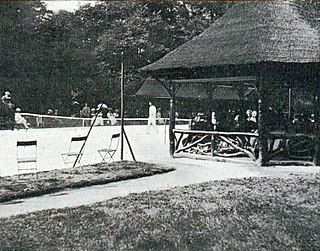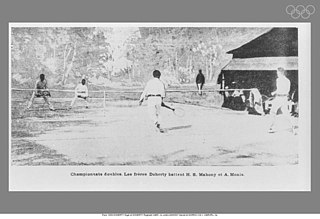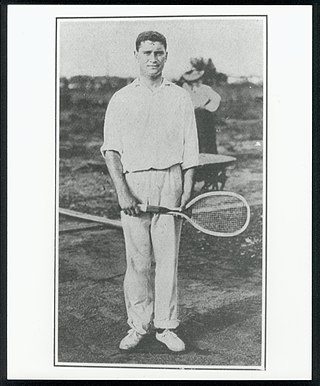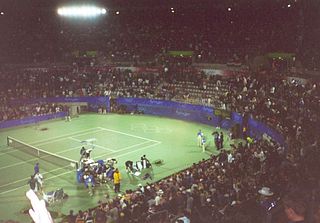
Charlotte "Chattie" Cooper Sterry was an English female tennis player who won five singles titles at the Wimbledon Championships and in 1900 became Olympic champion. In winning in Paris on 11 July 1900, she became the first female Olympic tennis champion as well as the first individual female Olympic champion.

Reginald "Reggie" or "R. F." Frank Doherty was a British tennis player and the older brother of tennis player Laurence Doherty. He was known in the tennis world as "R.F." rather than "Reggie". He was a four-time Wimbledon singles champion and a triple Olympic Gold medalist in doubles and mixed doubles.

Major Josiah George Ritchie was a tennis player from Great Britain. Major was his first name, not a military title. He was born in Westminster, educated at Brighton College and died in Ashford.

The United Kingdom of Great Britain and Ireland competed as Great Britain at the 1900 Summer Olympics in Paris, France. It was the second appearance of Britain after having participated in the inaugural 1896 Games. In Olympic competition, the nation has always shortened its official name to Great Britain rather than the United Kingdom seen elsewhere.

The United States' Ken Flach and Robert Seguso defeated Spain's Sergio Casal and Emilio Sánchez in the final, 6–3, 6–4, 6–7(5–7), 6–7(1–7), 9–7 to win the gold medal in Men's Singles tennis at the 1988 Summer Olympics. It was the second consecutive American victory in the event and its record-equaling third gold overall. Czechoslovaka's Miloslav Mečíř and Milan Šrejber and Sweden's Stefan Edberg and Anders Järryd won the bronze medals. It was the first medal in the event for Spain, Sweden, and Czechoslovakia.

The men's singles was an event on the tennis at the 1900 Summer Olympics program in Paris. It was held on 6 July and 11 July 1900. A total of 13 players from three nations competed, with two additional players withdrawing. This was the first time in Olympic history that Great Britain had a medal sweep in an event. Laurence Doherty took top honors, beating Harold Mahony in the final. Laurence's brother Reginald refused to play Laurence in the semifinals and forfeited; he and Arthur Norris are considered bronze medalists.

The men's doubles was an event on the tennis at the 1900 Summer Olympics program in Paris from 6 to 11 July. Sixteen players from 3 nations competed as eight pairs, including two mixed teams. The event was won by brothers Laurence Doherty and Reginald Doherty, defeating Max Décugis of France and Basil Spalding de Garmendia of the United States in the final. With no bronze-medal match, bronzes went to two teams: the French pair of Guy de la Chapelle and André Prévost and the British pair of Harold Mahony
Arthur Norris.

The mixed doubles was an event on the Tennis at the 1900 Summer Olympics program in Paris. It was held from 6 to 11 July at the Île de Puteaux. There were 12 competitors from 4 nations, with 3 of the teams being mixed teams. The event was won by British pair Charlotte Cooper and Reginald Doherty. The other three medals were taken by the three mixed teams: Hélène Prévost of France and Harold Mahony of Great Britain earned silver, while the bronze medals went to the Bohemian/British combination of Hedwiga Rosenbaumová and Archibald Warden and the American/British pair of Marion Jones and Laurence Doherty. All 5 of the British players thus ended up receiving a medal.

The men's (outdoor) singles was one of six lawn tennis events on the Tennis at the 1908 Summer Olympics programme. The tournament was played on grass courts at the All England Lawn Tennis and Croquet Club. There were 31 competitors from 9 nations. Nations could enter up to 12 players. The event was won by Major Ritchie of Great Britain, the nation's third victory in four Games. Otto Froitzheim earned Germany's first medal in the event with his silver. Another Briton, Wilberforce Eaves, took bronze.

The women's singles (outdoor) was one of six lawn tennis events on the Tennis at the 1908 Summer Olympics programme. The number of withdrawals resulted in empty brackets, with one player making it to the final without playing a single match while another had to win two to advance to that point. Nations could enter up to 12 players. In all, 13 women from 4 nations were entered but only 5 from Great Britain competed. The tournament was held from 7 to 11 July at the All England Lawn Tennis and Croquet Club. It was won by Dorothea Douglass Lambert Chambers, with Dora Boothby taking silver and Ruth Winch bronze.

The men's doubles was a tennis event held as part of the Tennis at the 1904 Summer Olympics programme. It was the third time the event was held at the Olympics. There were 30 players from 2 nations, comprising 15 pairs including one mixed team. Only one player was from outside the United States; all medals were won by Americans. The event was won by Edgar Leonard and Beals Wright, defeating Alphonzo Bell and Robert LeRoy in the final. The two bronze medal pairs were Clarence Gamble (tennis)/Arthur Wear and Joseph Wear/Allen West. The medals were the first credited to the United States in the men's doubles, though an American had been part of a silver medal mixed team in 1900.

Canada's Sébastien Lareau and Daniel Nestor defeated the defending gold medalists, Australia's Todd Woodbridge and Mark Woodforde, in the final, 5–7, 6–3, 6–4, 7–6(7–2) to win the gold medal in Men's Doubles tennis at the 2000 Summer Olympics. It was Canada's first men's doubles medal. The Woodies became the first pair to win multiple medals in the event, and the second and third individuals to do so. In the bronze medal match, Spain's Àlex Corretja and Albert Costa defeated South Africa's David Adams and John-Laffnie de Jager, 2–6, 6–4, 6–3. It was Spain's first medal at the event.

The (outdoor) men's singles competition at the 1912 Summer Olympics was part of the tennis program for the games. There were 49 competitors from 12 nations. Nations were limited to 8 players each. The event was won by Charles Winslow in an all-South African final over Harold Kitson; they were the nation's first medals in the men's singles. Oscar Kreuzer of Germany won the bronze-medal match against Bohemian Ladislav Žemla.

The outdoor men's doubles competition at the 1912 Summer Olympics was part of the tennis program for the games. There were 42 players from 10 nations, comprising 21 teams. Nations were limited to 4 pairs each. The event was won by South African team Harold Kitson and Charles Winslow, defeating Austrians Felix Pipes and Arthur Zborzil in the final. It was the first medal in the event for both nations. France earned its first men's double since 1900 as Albert Canet and Édouard Mény de Marangue defeated Jaroslav Just and Ladislav Žemla of Bohemia in the bronze-medal match.

The outdoor mixed doubles competition at the 1912 Summer Olympics was part of the tennis program for the games. It was held from 1 to 5 July at Östermalms IP. 13 teams entered, but only 6 played. The event was won by German pair Dorothea Köring and Heinrich Schomburgk. The silver medalists were Sweden's Sigrid Fick and Gunnar Setterwall, while French team Marguerite Broquedis and Albert Canet took bronze.

The men's doubles was a tennis event held as part of the Tennis at the 1920 Summer Olympics programme. It was the sixth appearance of the event. A total of 44 players from 11 nations competed in the event, which was held from 16 to 24 August 1920 at the Beerschot Tennis Club. Nations were limited to four pairs each. The event was won by Noel Turnbull and Max Woosnam of Great Britain, defeating Seiichiro Kashio and Ichiya Kumagae of Japan in the final. It was Great Britain's third victory in the men's doubles, most of any nation. Japan's silver came in its debut in the event. France earned its second consecutive bronze medal as Pierre Albarran and Max Decugis had a walkover in what would have been an all-France bronze-medal match.

The women's singles was a tennis event held as part of the Tennis at the 1920 Summer Olympics programme. A total of 18 players from 7 nations competed in the event, which was held from 16 to 24 August 1920 at the Beerschot Tennis Club. The event was won by Suzanne Lenglen of France, defeating Dorothy Holman of Great Britain in the final. It was the second consecutive victory for a French woman, with Marguerite Broquedis winning the pre-war 1912 tournament. Kathleen McKane Godfree of Great Britain defeated Sigrid Fick of Sweden in the bronze-medal match.

The mixed doubles was a tennis event held as part of the Tennis at the 1920 Summer Olympics programme. It was the third appearance of the event. A total of 32 players from 7 nations competed in the event, which was held from 17 to 24 August 1920 at the Beerschot Tennis Club. French pair Suzanne Lenglen and Max Decugis took gold, with British players Kathleen McKane Godfree and Max Woosnam earning silver and Czechoslovakia's Milada Skrbková and Ladislav Žemla winning bronze. It was the first victory for France in the event; Czechoslovakia earned its first mixed doubles medal in its event debut.

Hugh Laurence "Laurie" Doherty was a British tennis player and the younger brother of tennis player Reginald Doherty. He was a six-time Grand Slam champion and a double Olympic Gold medalist at the 1900 Summer Olympics in singles and doubles. In 1903 he became the first non-American player to win the U.S. National Championships.

Belarus' Victoria Azarenka and Max Mirnyi defeated Great Britain's Laura Robson and Andy Murray in the final, 2–6, 6–3, [10–8] to win the gold medal in Mixed Doubles tennis at the 2012 Summer Olympics. In the bronze medal match, the United States' Lisa Raymond and Mike Bryan defeated Germany's Sabine Lisicki and Christopher Kas, 6–3, 4–6, [10–4].

















